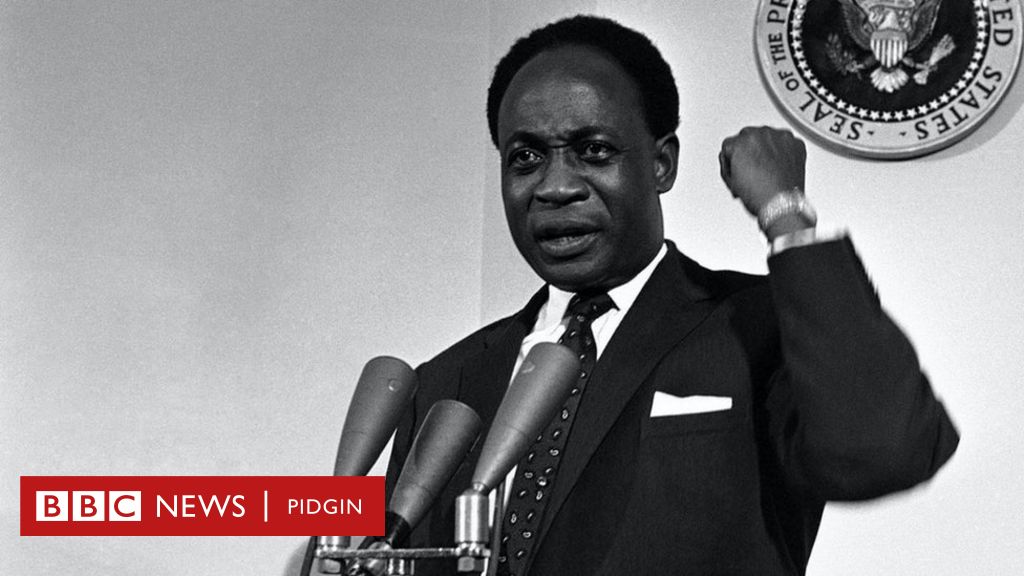Quotes, biography and what to know about the late Ghanaian politician and Kwame Nkrumah memorial day
[ad_1]
Wia dis foto comes from, Empics
Kwame Nkrumah on a visit to the United States as Prime Minister of Ghana
Ghana celebrates Kwame Nkrumah Memorial Day to mark the 112th anniversary of the independence fighter. Ghanaians set this day aside as a public holiday to remember the sacrifices made by Nkrumah, which made the country the first independent African country.
Dem was born Kwame Nkrumah on September 21, 1909 and died on April 27, 1972.
He is a Ghanaian politician, political theorist and African revolutionary leader who defends Pan-Africanism as a strategy to unite Africa into one.
He was the first Prime Minister and President of Ghana, after leading the Gold Coast to independence from Britain in 1957.
Ogbonge defender of Pan-Africanism, Nkrumah is a founding member of the Organization of African Unity and laureate of the Lenin Peace Prize of the Soviet Union for 1962.
In February 1966, as Nkrumah left Ghana for an official visit to North Vietnam in China, a group of military and police officials organized a coup to overthrow Am. Joseph Arthur Ankrah of the National Liberation Council den Lt. Gen. . Emmanuel Kotoko are two notable people who take responsibility for the coup.
Education
Kwame Nkrumah graduated from Achimota College in 1930, he began his career as a teacher in the Roman Catholic primary schools of Elmina and Axim.
Over the years he developed an interest in politics and therefore traveled to the United States to further his education.
He was admitted to the University of Lincoln, Pennsylvania, around 1935.
He obtained a bachelor’s degree in theology in 1939, then pursued a master’s degree at the University of Pennsylvania.
He studied the literature of socialism, where he himself participated in the theories of Karl Marx, Vladimir Lenin, of nationalism as a black American leader, champion of Marcus Garvey in the 1920s.
His political career took off when he became president of the Organization of African Students of the United States and Canada.
He left the United States in May 1945 for England, where he organized the 5th Pan-African Congress in Manchester.
Back to Ghana after school
Nkrumah returned to Ghana in 1947 to take a stand at the United Gold Coast Convention (UGCC) in 1947 at the invitation of the party leadership.
But he broke away from the UGCC to form the Convention Peoples Party (CPP) on the basis of his approach to the struggle for independence.
He defends the “self-government now†approach as opposed to the UGCC â€which proposes“ self-government as soon as possible â€.
Struggle for independence
As part of the struggle for independence, Nkrumah led civil unrest movements that took him to prison for a year.
But while in prison, Gold Coast held its first general election on February 8, 1951, where CPP candidate Kwame Nkrumah won the election.
The British colonial administration freed Nkrumah from prison to become head of government affairs for the Gold Coast in 1952.
Over the years he continued to push for self-government until the British granted Ghana independence on March 6, 1957.
1960: Ghana becomes a republic with a new constitution
Wia dis foto comes from, Getty Images
Kwame Nkrumah (center) waves to the crowd during the 6 March 1957 declaration of Ghana as an independent state from the British colony
On July 1, 1960, Dr Kwame Nkrumah declared Ghana a Republic and became the country’s first president.
The Republic of 1960 signifies the final exit of British colonialists from Ghana as they finally hand over all governance matters to the country’s indigenous rulers.
As a republic, Ghana introduced its own constitution and rules the country under Kwame Nkrumah.
But Kwame Nkrumah, the main mastermind behind the fight, made it possible for Ghana to gain independence, unfortunately he does not stay in power.
Around February 1966, General Kotoka overthrew his squad while out of the country.
Economic growth and rapid industrialization
Ghana under Kwame Nkrumah experienced the fastest industrial growth in the country’s history.
It creates employment opportunities for Ghana which is becoming one of the richest and industrialized countries in Africa.
Ghana has become the main exporter of cocoa worldwide, by increasing gold production, it has built the largest man-made lake in the Volta, which to date generates electricity for all of Ghana.
He built chaw roads, the most popular among Tema highways.
In addition, he defended a massive industrial dynamic, he transformed the whole town of Tema into an industrial center.
As part of the ten-year development plan, Nkrumah presented the second development plan in 1959 and initiated development plans for 600 industrial factories.
He also built schools, railroads, hospitals, introduced a social security system and more.
Nkrumah built the Ghanaian economy on the idea of ​​self-sufficiency, he argues, argues that Africa to engage in trade independently, otherwise it will end up in a new form of colonialism called – now – colonialism.
Most Popular Nkrumah Quotes
Wia dis foto comes from, Getty Images
Portrait of Nkrumah, leader of Ghana from 1957 to 1966
Nkrumah dey’s most notable quote includes
“I prefer liberty in danger than servitude in tranquility”
A clear message on the need for Africans to be freed from colonial rulers.
“Ghana’s independence only makes sense if it is linked to the total liberation of Africa”
Here, Nkrumah defends the Pan-African agenda for African countries to unite under one ruler, but that never happens until he dies for Conakry, Guinea, following an overthrow.
[ad_2]

